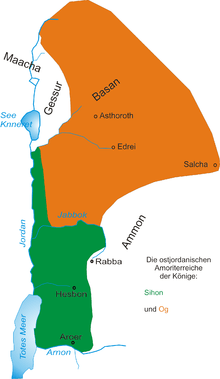Bashan

Bashan (/ˈbeɪʃən/; Hebrew: הַבָּשָׁן, ha-Bashan; Latin: Basan or Basanitis[1]) is a biblical place first mentioned in Numbers 21:33, where Og the king of Bashan came out against the Israelites at the time of their entrance into the Promised Land, but was utterly routed (Numbers 21:33–35; Deuteronomy 3:1–7).[2] Og's Bashan extended from Gilead in the south to Hermon in the north, and from the Jordan river on the west to Salcah on the east. Along with the half of Gilead it was given to the half-tribe of Manasseh (Joshua 13:29–31). Golan, one of its cities, became a Levitical city and a city of refuge (Joshua 21:27).
According to the Torah, the Israelites invaded Bashan and conquered it from the Amorites. Deuteronomy 3:1–7 states:
Next we turned and went up along the road toward Bashan, and Og king of Bashan with his whole army marched out to meet us in battle at Edrei. The LORD said to me, "Do not be afraid of him, for I have handed him over to you with his whole army and his land. Do to him what you did to Sihon king of the Amorites, who reigned in Heshbon. So the LORD our God also gave into our hands Og king of Bashan and all his army. We struck them down, leaving no survivors. At that time we took all his cities. There was not one of the sixty cities that we did not take from them—the whole region of Argob, Og's kingdom in Bashan. All these cities were fortified with high walls and with gates and bars, and there were also a great many unwalled villages. We completely destroyed them, as we had done with Sihon king of Heshbon, destroying every city—men, women and children. But all the livestock and the plunder from their cities we carried off for ourselves.
Argob, in Bashan, was one of Solomon's commissariat districts (1 Kings 4:13). The cities of Bashan were taken by Hazael (2 Kings 10:33), but were soon after reconquered by Jehoash (2 Kings 13:25), who overcame the Syrians in three battles, according to the prophecy of Elisha (19). From this time Bashan almost disappears from history, although we read of the wild cattle of its rich pastures (Ezekiel 39:18; Psalms 22:12), the oaks of its forests (Isaiah 2:13; Ezekiel 27:6; Zechariah 11:2), the beauty of its extensive plains (Amos 4:1;[3] Jeremiah 50:19), and the rugged majesty of its mountains (Psalm 68:15). Soon after the conquest, the name "Gilead" was given to the whole country beyond Jordan. After the Exile, Bashan was divided into four districts:
- Gaulonitis, or Jaulan, the most western
- Auranitis, the Hauran (Ezekiel 47:16)
- Argob or Trachonitis, now the Lejah
- Batanaea, now Ard-el-Bathanyeh, on the east of the Lejah, with many deserted towns almost as perfect as when they were inhabited.
References
- ↑ Barrington Atlas of the Greek and Roman World. See .
- ↑ "Bashan". Encyclopædia Britannica. Retrieved 7 February 2014.
- ↑ "BibleHub - Amos 4:1". Retrieved 7 February 2014.
Further reading
- Aharoni, Yohanan (1 January 1979). "The Transjordanian Highlands". The Land of the Bible: A Historical Geography. Westminster John Knox Press. pp. 36–42. ISBN 978-0-664-24266-4.
- MacDonald, Burton (2000). "Settlement of the Israelite Tribes East of the Jordan". In Matthews, Victor. East of the Jordan: Territories and Sites of the Hebrew Scriptures. American Schools of Oriental Research.
- Porter, Rev. J. L. (1867). The Giant Cities of Bashan; and Syria's Holy Places.
External links
- Golan Heights (Biblical Bashan) on Bibleplaces